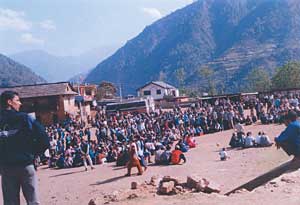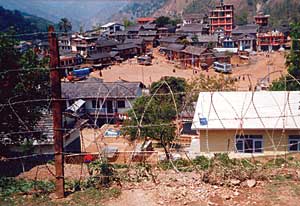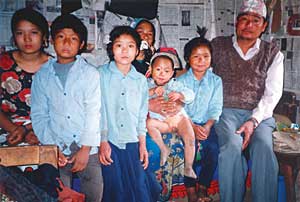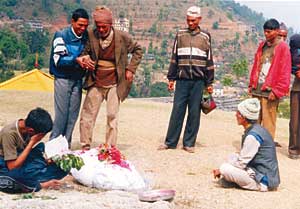 There are winds of change blowing in Rolpa. For the first time in four years, political workers under the protection of security forces have returned to parts of Rolpa that were under Maoist control.
There are winds of change blowing in Rolpa. For the first time in four years, political workers under the protection of security forces have returned to parts of Rolpa that were under Maoist control. Reading about this in the faraway capital, it may not seem like much. But it is an indication of the changing circumstances of the insurgency that the Maolands of the mid-west aren't as impregnable as they used to be.
To be sure, this does not mean that the Maoists are on the run. But it is the first sign that the tide may be turning, and it is also an opening for the government and all parliamentary parties to restore hope to the villages that they have abandoned. Their presence is important to show the people that they care for their welfare, and to get them to participate with their elected leaders to rebuild ruined villages.
Around the time that political parties in Kathmandu were sitting down three weeks ago in joint efforts to take their activism to rural areas, political workers here were already doing just that. They moved into areas of Rolpa that the security forces have managed to liberate: the villages of Thabang, Gam, Mase, Satdobato and Madichaur. The presence of the army has brought new hope to the people who have only one wish: that peace is restored that they can start rebuilding their shattered lives.
Two weeks ago, some 1,000 people had gathered in Gam for a public meeting. Local political leaders, the Chief District Officer from Libang, and local elders all spoke about the effort to bring life back to normal. Some days before that, a local voluntary group organised a seminar in Libang to discuss what the people of Rolpa could do in the current political environment.
Representatives of different political parties made commitments to form an alliance against Maoist violence, and agreed to spread the word on the Maoists' double standards and hypocrisy. Especially the fact that after destroying the education system, Maoist leaders had their children in private schools in Kathmandu, India and London.
What was surprising was not what was said at the meetings, but where the meetings were held: in the heartland of Maoist activity. This isn't the first time that politicians have tried to re-start political activity. Last year, the UML organised a Rapti Peace March that passed through Dang, Sallyan, Rukum and Pyuthan before visiting several villages in Rolpa.
 At that time, this was seen as a direct challenge to the Maoists, who had begun to fill the political vacuum they'd created in the villages by killing or chasing away local political workers. Even so, thousands of people from the five districts gathered for the public rally in Rolpa. This time, it is not just the UML, but all political parties holding joint public meetings.
At that time, this was seen as a direct challenge to the Maoists, who had begun to fill the political vacuum they'd created in the villages by killing or chasing away local political workers. Even so, thousands of people from the five districts gathered for the public rally in Rolpa. This time, it is not just the UML, but all political parties holding joint public meetings. Rolpa plunges into darkness after dusk. There is no power, since the Maoists destroyed the Jhimruk power station last month. The people of Rolpa, who had got used to electricity, are now back to burning pine resin dhupi, as kerosene is too expensive. Most ordinary people cannot understand what the Maoists have gained by destroying Jhimruk, and pushing Rolpa's development back by decades.
Rolpa has many problems, but the most pressing is the lack of health care. The district hospital was built many years ago, but because of government ineptitude, never treated a single patient. A brand new building is in ruins. Every time they see the hospital, the people of Rolpa curse the government. And this is the district headquarters. We can only guess how much worse the situation must be in the villages. To add to the feeling of hopelessness and isolation, Rolpa has been cut off from the rest of Nepal since the Maoists destroyed the telephone repeater tower at Ratmate in December.
The only link to the outside world is the Bhaluwang-Libang road, which is actually a dirt track. The road has been repeatedly attacked by Maoists, who stop buses, block roads and also blow up parts of it every once in a while. These days, passengers have to endure frisking by security forces. "It's just not worth the risk anymore," says a transport operator. "We face too many hassles, sometimes we are extorted, threatened, and our buses are set on fire." It would not be an exaggeration to say that the buses here can operate only with the blessings of the Maoists. There has been talk of operating a helicopter service to Libang, but that is just talk.
Rolpa has always been a food-deficit district. Rolpalis migrate for work when the food runs out, or depend on grain flown in. Now even that is difficult, since the army is enforcing a food embargo to starve out the Maoists. And the Maoists have plundered whatever food there is left. No one is planting any grain for fear that the harvest will be looted. This has put the price of grain out of reach-rice costs Rs 150 per pathi. Those who suffer the most are the children, who fall sick because there isn't enough to eat. And when they fall sick, there is no health care. The people of Rolpa just try to survive from day to day.
Thousands have fled the Maoist violence in the hinterland to the relative safety of Libang. Many more have already left to work in India. The better-off are living in Kathmandu, Dang and other parts of Nepal. But even if they are away, it doesn't mean they are safe. The Maoists attack their houses and their relatives.
A teacher from Korchebang, Mahendra Pun, fled his village two years ago and had been living at the Ghartigaon police outpost. He came to the district headquarters after that police station was razed by the Maoists. Some weeks ago, the Maoists ransacked his home, and now his mother, wife and five children have all moved down to Libang. Pun's wife Purna Kumari said 250 armed Maoists came to their house on 2 April, and forced them out. "They told us: your husband lives in the district headquarters so you cannot continue living here," she recalls tearfully.
 Tham Bahadur Sunuwar of Ghartigaon had been forced to flee because the Maoists accused him of being an informant. After he had fled they ransacked his house and belongings and chased the 11 remaining members of his family out of the village. Tham Bahadur has no idea of how he is going to make ends meet, and joins hundreds of other refugees in Libang who have no home, no farm, no food, and no work.
Tham Bahadur Sunuwar of Ghartigaon had been forced to flee because the Maoists accused him of being an informant. After he had fled they ransacked his house and belongings and chased the 11 remaining members of his family out of the village. Tham Bahadur has no idea of how he is going to make ends meet, and joins hundreds of other refugees in Libang who have no home, no farm, no food, and no work. Despite Maoist warnings not to go ahead, Rolpa was able to organise its DDC meeting, and attendance was more than 90 percent. There are indications that many are fed up with Maoist excesses. Everyone at the meeting agreed that the violence had to stop so the district could get back to improving the lives of the Rolpalis.
In Libang large numbers of people crowd around the CDO office every day. Most have come for citizenship papers and passports. Since November, more than 6,000 citizenship certificates have been made, mostly for young men fleeing the Maoists. Many intend to migrate to work.
Others are in Libang to pay land taxes to the VDC secretaries, now camping here because the Maoists don't allow the collection of land taxes in the villages. In late March they killed Amrit Bahadur Khatri, a peon of Bhabang VDC. His crime: reminding people in the village to pay their land taxes. Khatri had a physical disability. He also came from a family that did not have enough to eat for more than three months of a year. Maoists had already killed the chairman and vice-chairman of Bhabang VDC.
Libang has now been fenced off with barbed wire. The villagers must pass through security checks before entering and leaving the town. It looks like a garrison town, but residents and government employees say they feel more secure. Kumar Dasaudi, secretary of the UML in Rolpa says, "The country has had a state of emergency for six months. Here in Libang we've had a crisis for six years." There is an unofficial curfew every evening, and there are reports of people being killed every day.
 After the battle at Lamahi and Satbaria a helicopter delivering dead policemen stopped in Rolpa and pulled out a body. It was Purna Bahadur BK, a 25-year-old constable from Libang. He had joined the police to earn money to support his family. He leaves behind his widow, child and father, Mohan Lal, a sweeper in Libang.
After the battle at Lamahi and Satbaria a helicopter delivering dead policemen stopped in Rolpa and pulled out a body. It was Purna Bahadur BK, a 25-year-old constable from Libang. He had joined the police to earn money to support his family. He leaves behind his widow, child and father, Mohan Lal, a sweeper in Libang. There are thousands of Purna Bahadurs all over Nepal. It's a people's war all right-ordinary people like Purna Bahadur and Amrit Bahadur die. It is the 12 people who were burned to death in Harjang. It is Tilak Nepali and Bishnu Prasad KC, two teachers killed recently, or the retired policeman in Pakhapani who was hacked to death.
Then there are the killings by the other side. Shibe KC, a teacher, was killed because the security forces were misinformed that he was a Maoist. Earlier this month, five innocent locals were gunned down after a Maoist booby trap went off in Seuri. The real Maoists who planted the explosives fled, but Dil Bahadur Buda, a Nepali Congress supporter, his daughter-in-laws Seti and Sahali and two others were killed in the shootout.
Rolpa is now synonymous with violence. Murder, terror and mayhem happen every day. Many innocent people are dying. The survivors struggle to survive from day to day. Thousands are homeless. There is a severe shortage of food.
It there are also signs that the people are fed up with the violence and they are no longer afraid of saying so. If the unity of the political parties can be maintained, the brave resistance of the people of Rolpa may yet inspire the rest of the nation.
(Prakash Jwala is the UML MP from Sallyan, and visited Rolpa 9-15 April)


